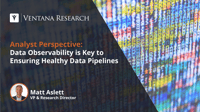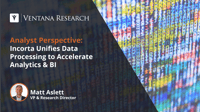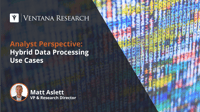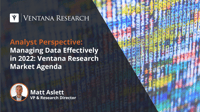I recently described the emergence of hydroanalytic data platforms, outlining how the processes involved in generating energy from a lake or reservoir were analogous to those required to generate intelligence from a data lake. I explained how structured data processing and analytics acceleration capabilities are the equivalent of turbines, generators and transformers in a hydroelectric power station. While these capabilities are more typically associated with data warehousing, they are now...
Read More
Topics:
Analytics,
Data Governance,
Data Integration,
Data,
data lakes,
data operations,
AI & Machine Learning,
data platforms,
Streaming Data & Events
As I stated when joining Ventana Research, the socioeconomic impacts of the pandemic and its aftereffects have highlighted more than ever the differences between organizations that can turn data into insights and are agile enough to act upon it and those that are incapable of seeing or responding to the need for change. Data-driven organizations stand to gain competitive advantage, responding faster to worker and customer demands for more innovative, data-rich applications and personalized...
Read More
Topics:
business intelligence,
Analytics,
Data Integration,
Data,
data lakes,
data operations,
AI & Machine Learning,
data platforms,
Streaming Data & Events
I recently described how the data platforms landscape will remain divided between analytic and operational workloads for the foreseeable future. Analytic data platforms are designed to store, manage, process and analyze data, enabling organizations to maximize data to operate with greater efficiency, while operational data platforms are designed to store, manage and process data to support worker-, customer- and partner-facing operational applications. At the same time, however, we see...
Read More
Topics:
embedded analytics,
Analytics,
Business Intelligence,
Data,
Digital Technology,
AI & Machine Learning,
data platforms,
Analytics & Data,
Streaming Data & Events,
Natural Data
Ventana Research recently announced its 2022 Market Agenda for Data, continuing the guidance we have offered for nearly two decades to help organizations derive optimal value and improve business outcomes.
Read More
Topics:
Data Governance,
Data Integration,
Data,
data lakes,
data operations,
data platforms,
Streaming Data & Events














